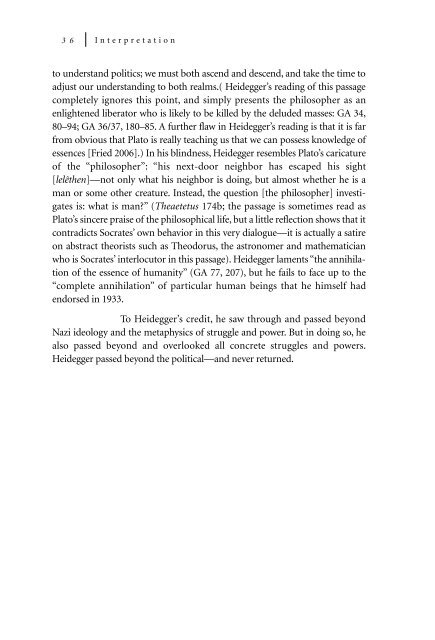Beyond Struggle and Power: Heidegger's Secret ... - Interpretation
Beyond Struggle and Power: Heidegger's Secret ... - Interpretation
Beyond Struggle and Power: Heidegger's Secret ... - Interpretation
Create successful ePaper yourself
Turn your PDF publications into a flip-book with our unique Google optimized e-Paper software.
3 6 <strong>Interpretation</strong><br />
to underst<strong>and</strong> politics; we must both ascend <strong>and</strong> descend, <strong>and</strong> take the time to<br />
adjust our underst<strong>and</strong>ing to both realms.( Heidegger’s reading of this passage<br />
completely ignores this point, <strong>and</strong> simply presents the philosopher as an<br />
enlightened liberator who is likely to be killed by the deluded masses: GA 34,<br />
80–94; GA 36/37, 180–85. A further flaw in Heidegger’s reading is that it is far<br />
from obvious that Plato is really teaching us that we can possess knowledge of<br />
essences [Fried 2006].) In his blindness, Heidegger resembles Plato’s caricature<br />
of the “philosopher”: “his next-door neighbor has escaped his sight<br />
[lelêthen]—not only what his neighbor is doing, but almost whether he is a<br />
man or some other creature. Instead, the question [the philosopher] investigates<br />
is: what is man?” (Theaetetus 174b; the passage is sometimes read as<br />
Plato’s sincere praise of the philosophical life, but a little reflection shows that it<br />
contradicts Socrates’ own behavior in this very dialogue—it is actually a satire<br />
on abstract theorists such as Theodorus, the astronomer <strong>and</strong> mathematician<br />
who is Socrates’ interlocutor in this passage). Heidegger laments “the annihilation<br />
of the essence of humanity” (GA 77, 207), but he fails to face up to the<br />
“complete annihilation” of particular human beings that he himself had<br />
endorsed in 1933.<br />
To Heidegger’s credit, he saw through <strong>and</strong> passed beyond<br />
Nazi ideology <strong>and</strong> the metaphysics of struggle <strong>and</strong> power. But in doing so, he<br />
also passed beyond <strong>and</strong> overlooked all concrete struggles <strong>and</strong> powers.<br />
Heidegger passed beyond the political—<strong>and</strong> never returned.
















